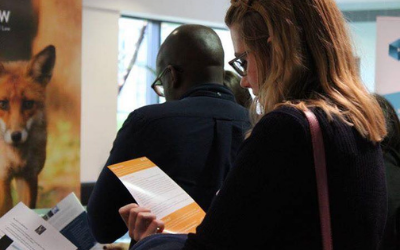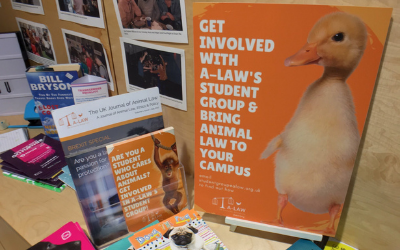RAWO’s website boldly states, “Let’s take care of animals”, and that is precisely what the charity does. Based in the Musanze district of Rwanda, its objective is to advance animal welfare in the country by improving the wellbeing of animals and humans. A-Law recently had the privilege of chatting to RAWO’s founder and Executive Director, Jean Claude Masengesho, to find out more about the charity and the invaluable work it is undertaking.
History of RAWO
Jean Claude graduated from the University of Rwanda as a veterinary surgeon in 2014, after which he travelled to Austria to study veterinary medicine. He was there for six months, focussing on veterinary diagnostic techniques. Later, in 2016, Jean Claude began working at an animal hospital in Rwanda and started to learn more about animal welfare. This led him to attend a workshop in Tanzania in 2017, organised by WTG Vets United. This inspired him and sparked the idea of setting up an animal welfare organisation in Rwanda. Jean Claude knew that there were many animal welfare charities across Africa and, whilst there were several in Rwanda dedicated to conservation, there were very few that focussed specifically on the welfare of companion and farm animals. He explained, “wild animals are lucky … they have really strong organisations taking care of them”. Unfortunately the same could not be said for livestock and dogs, for example.
Jean Claude then began working hard as an advocate for animal welfare, eventually founding RAWO in 2020. Whilst there were setbacks due to the Covid-19 pandemic, this didn’t deter Jean Claude and RAWO is now flourishing under his leadership.
Current Projects
Jean Claude spoke about three of the projects that the organisation is currently working on: humane dog population management, raising animal welfare awareness among livestock farmers and educating children at local primary schools about animal welfare.
Humane Dog Population Management
RAWO has partnered with the Rwandan Government on a project to vaccinate the local dog population against rabies. Jean Claude explained how RAWO is raising awareness of animal welfare among dog owners and, ultimately, promoting responsible dog ownership. This includes teaching owners how to show compassion towards dogs and about the importance of following the Government’s vaccination programme. “It’s all about prevention” Jean Claude says, explaining that it is necessary to change the mind-set of those who own dogs. He remarks, “dogs are not only there for security purposes, but they are living things, sentient beings”. Therefore, it is important to look after their physical and mental health.
Raising Animal Welfare Awareness Among Livestock Farmers
Every month, Jean Claude and his team visit a different sector (Rwanda is split into provinces, districts and sectors, and has 416 sectors in total) to train livestock farmers on the Five Freedoms of Animal Welfare. The team also carry out animal welfare assessments to ensure the animals are healthy and have enough water and space.
In terms of educating farmers about animal welfare Jean Claude provides an example of a warning that he and his team always give: “if you can’t drink the water yourself, don’t give it to your animals”. The team also teaches farmers that animals must be accommodated in a way that allows them to express normal behaviour and satisfies their right to be outside enjoying nature, rather than being confined to cramped, indoor spaces.
RAWO also advocates for the responsible use of antibiotics and the dangers of antimicrobial resistance. Jean Claude explained how important it is that the farmers are taught about the impact of welfare in animal production, particularly given the heavy reliance that Rwanda has on farming. Jean Claude highlighted the Girinka programme as an example of the importance of cattle in Rwandan culture. Girinka began in 2006 in order to tackle child malnutrition and poverty in Rwanda. This is accomplished by giving a cow to each poor family throughout Rwanda and teaching them how to look after it so that they can profit from the milk it produces. When a calf is born, it is passed onto the next eligible beneficiary to enable the cycle to continue. The animal welfare programme run by RAWO supports Girinka by continuing and advancing the education of livestock farmers.
Animal Welfare Education in Schools
Another project that RAWO is currently engaged in is teaching animal welfare to primary school children. This is hugely important, since it is these children who will be taking over responsibility for their families’ farms when they are older. Again, RAWO teaches the children how to treat their animals with compassion. RAWO’s team reminds children that animals “have a brain, they can remember, so don’t ever beat or abuse them but instead try to initiate a good relationship with them”.
So far, RAWO has taught at three different schools, imparting knowledge about compassion for animals and the vital link between animals, the environment and humans.
Legal Landscape in Rwanda
Jean Claude explained that, whilst there are different ministerial orders relating to animals, there is no primary legislation aimed at safeguarding the welfare of animals, particularly domestic animals. At RAWO, the team is trying to engage with key partners by demonstrating the desperate need for such legislation. However, hope is on the horizon with a draft animal welfare bill currently passing through the Senate. A-Law will track the updates on this bill and hopes to provide more information once available.
Jean Claude explained that, initially, some politicians were not very enthusiastic about tackling animal welfare issues. Indeed, promoting animal welfare is challenging in Rwanda, predominantly due to lack of knowledge and financial aid. However, through its many projects, RAWO has managed to demonstrate to the Government that animal welfare contributes significantly towards the wellbeing of animals and, subsequently, to animal production and public health. This has led to more government engagement in teaching the population about animal welfare. Jean Claude is rightly very proud of the programmes that are run by RAWO and said that he is getting a lot of positive feedback and comments from local leaders.
Looking to the Future
Jean Claude acknowledged that his team is only small at the moment, but he hopes to grow the team to allow RAWO to serve the whole country and have at least one animal welfare ambassador in every district (there are 30 districts in total).
The organisation’s second objective is for its team to be advocates for stronger animal welfare legislation. Jean Claude says, “we want to be among the taskforce for the implementation of the draft law…to be a voice for animals.”
Jean Claude also hopes to attend more workshops in order to continue the advancement of animal welfare in Rwanda. He explained that one of the challenges he faces is not knowing anyone who specialises in animal welfare, particularly in Africa, who can offer guidance and support when needed. However, after attending the Martin’s Act Bicentenary Anniversary Conference held by A-Law in 2022, he was able to build contacts to help further RAWO’s objective.







